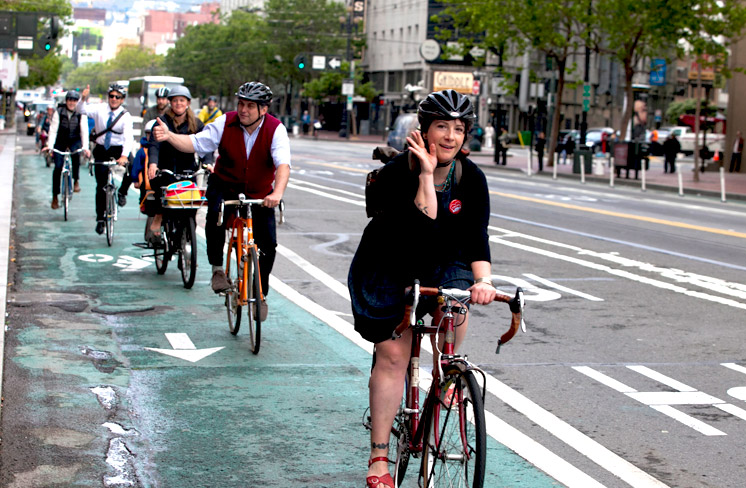The cycling commuter
How far are you willing to go to work on a bicycle? A mile? Five miles? Ten miles or more? Why not?
Jun 27,2015
 listen
listen
.
Narrator: How far are you willing to go to work on a bicycle? A mile? Five miles? Ten miles or more? Why not?
Woman: It's too far.
Narrator: Use a train or bus and ride the rest of the way.
Woman: I don't have time.
Narrator: A bicycle is faster than sitting in traffic.
Woman: Those hills are so steep.
Narrator: Thought about an electric assisted bicycle?
Man: It's too dangerous.
Narrator: Actually, San Diego was awarded “Best cycling city” by Bicycle Magazine and we have safe bike paths, bike lanes and routes nearly everywhere.
Man: I don't want to show up to work all sweaty.
Narrator: You don't have to get sweaty with an electric bike.
Man: Too expensive to buy an electric bike.
Narrator: The initial investment is less than a thousand dollars and after that, you'll start saving in gas and insurance, and it's a lot of fun. Commuting on an electric bicycle has many benefits. One of them is pure cost savings. No more expensive trips to the gas station, no more parking trouble, or you could go all the way and get rid of your car completely. What would you do with all that extra money?
How about the health benefits? Electric bicycles turn your passive commute into a daily workout. A moderate daily workout encourages the type of fat burning exercise that cuts weight. Regular activity improves your physical and mental health which can reduce stress, depression and improve your mood. Even more impressive, moderate bicycle riding can prevent heart disease by reducing high blood pressure and cholesterol and daily exercise makes it easier to fall and stay asleep throughout the night.
If all this were not enough, you'll also be improving the environment. Riding an electric bicycle cuts your carbon footprint by thousands of tons every year and it's powered by an energy source increasingly made up of renewable energy. Surprisingly, riding an electric bicycle can be even better for the environment than riding on human power alone. Human power requires foods that have a high CO2 footprint and are typically grown and produced far away, while electricity is often generated locally.
There is also a social benefit to riding bicycles which improves urban life and builds community. Riding enables you to see and interact with people and not just anonymous pieces of metal. On a larger scale, it reduces our dependency on oil and allows us to direct tax money to our building liveable communities instead of securing oil supplies. We can redirect our efforts into building a better quality life where urban living includes miles of bicycle paths, pedestrian zones, parks and efficient public transit. So dust off your bicycle, leave the car keys at home and start the future today.
